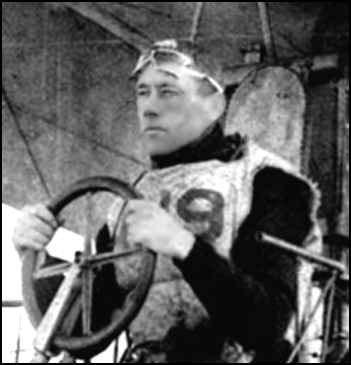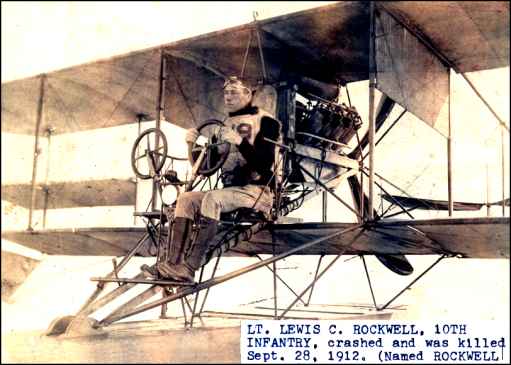
1885-1912 |
 |
 |
|
Contributed by Craig Bryan, 10-23-09 |
|
The Daily Journal and Tribune, Knoxville, Tennessee: September 29, 1912, Transcribed by Bob Davis - 6-11-04 "Sacrificed to Aviation were Two More Lives on U. S. Army Aviation Field. Aeroplane Fell 35 Feet Killing Both Occupants. Brother Officers Who Witnessed the Accident Were Unable to Account for It." "Lieutenant Rockwell had started up with Corporal Scott as a passenger to make a test flight in his trial for a military aviator's license. They had been in the air about eight minutes, ascending to a height of five hundred feet, then gliding down, had gotten within thirty-five of the ground. At this point the aviator turned the machine upward again and something went wrong. Instantly the aeroplane buckled and crashed to the ground. Scott was hurled several hundred feet from the machine while Rockwell lay a few feet away from him. Brother officers found Scott lifeless. Rockell, his head buried partly in the earth, still showed signs of life but was unconscious. He was rushed to a hospital. He never regained consciousness. Brother officers who witnessed the accident were at a loss to account for it. Captain Charles DeForest Chandler, commanding officer of the aviation school, immediately convened a board of inquiry to make an investigation. The board will meet next week. A single utterance of Lieutenant Rockwell probably brought death to Corporal Scott and saved the life of Captain Hennessy. When Rockwell was about to start aloft, Captain Hennessy requested that he be taken along as a passenger. Lieutenant Rockwell replied: "No, You're too heavy." And Corporal Scott was selected to accompany the Lieutenant. Lieutenant Rockwell was regarded as a most careful aviator. Three weeks ago he received his certificate as (a) civilian pilot. Lieutenant Rockwell was the fourth commissioned officer of the United States army to meet death in an aviation accident. The death toll levied through accidents of the United States army now totals six. Lieutenant Rockwell's home was in Cincinnati. He was almost twenty-eight years of age. Entering the United States military academy in 1903 he graduated and received his commission as a second lieutenant in 1907. He was assigned to the Third infantry and afterwards was transferred to the Tenth infantry, from which he volunteered his services in the aviation corps. Corporal Scott was attached to the signal corps of the army." |
|
The Daily Journal and Tribune, Knoxville, Tennessee: Saturday, October 4, 1912, Transcribed by Bob Davis - August 18, 2007 ""Defective Eyesight Caused Aviator's Death," Since the tragedy many of Lieutenant Rockwell's friends have recalled that he was subject to sudden spells of blurred vision. It is not unlikely that in the future all army aviators will have to pass a more rigid occular test." |
|
(9-2-07), you will find about 26 links. |
|
|
|
|
|
1903-1913 |
|
If you have any more information on this pioneer aviator, please contact me. E-mail to Ralph Cooper Back 

|